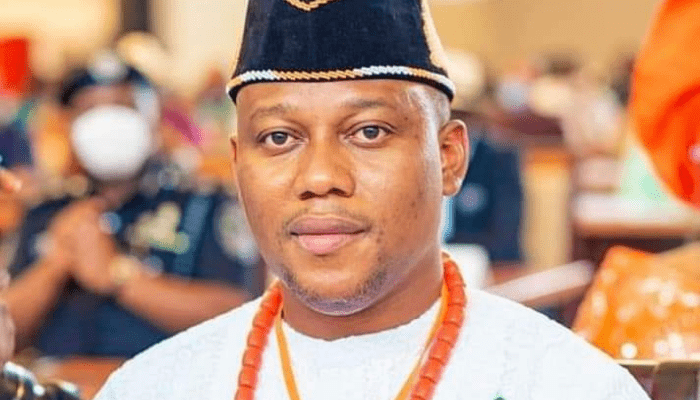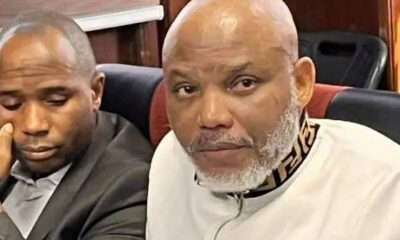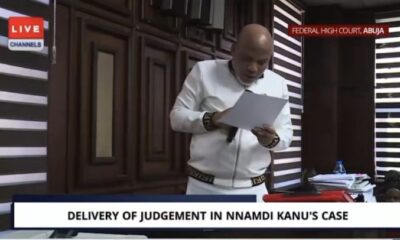Politics
June 12 Echoes As Ememobong Resigns In Akwa Ibom Political Split

These are interesting times in Nigeria. June 12 is on the lips of many Nigerians today. The date means different things to different people. It would seem that governance has lost its meaning here. There’s a need for a rethink. Last week was especially historic in Akwa Ibom State. A commissioner, Ini Ememobong, refused to follow the “multitude”; he decided to be a lone ranger. There is hope for our country!
June 12: The pang and fury linger 32 years after
The commemoration of June 12, 1993, today will be a mixed bag. For some Nigerians, it will be an occasion of rolling out the drums and clinking of glasses in celebration, but for many others, it will catapult them back to the feeling of the pang and fury of that unfortunate moment.
Precisely 32 years ago, a presidential election was held in Nigeria, the first since the military coup ended the Second Republic.
The election held so much hope for the country. It was organised by the military junta led by Ibrahim Badamasi Babangida (IBB) through the National Electoral Commission (NEC) superintendent Humphrey Nwosu, a professor.
The election was a straight fight between Moshood Kashimawo Olawale (MKO) Abiola of the Social Democratic Party (SDP) and Bashir Tofa of the National Republican Convention (NRC).
It was one of the most peaceful elections in the history of Nigeria, but the winner was never declared, as the exercise was annulled by IBB, citing electoral irregularities.
The annulment ushered in a chain of political instability, leading to the forced “stepping aside” of Babangida and the installation of a weak interim government headed by Ernest Shonekan.
Shonekan was later shoved aside by General Sani Abacha who imposed himself as the head of state.
The chains of crises that arose following the annulment, including the brutal assassination of Kudirat Abiola and the unexplainable death of MKO Abiola in Abacha’s gulag, led to the death of many innocent citizens in some parts of the South West geo-political zone where Abiola hailed from.
Before then, dozens of Nigerians had died either on the road or in their villages as they fled Lagos and some other states across the country for fear of an outbreak of war.
Normalcy began to return following the sudden death on July 7, 1998, of Abacha and the enthronement of Abdulsalami Abubakar as the new head of state.
The belief that Abiola won the annulled election has been widespread in the country, but the media have always cautiously used the phrase ‘presumed winner’.
But things began to get clearer as to the real winner of the 1993 presidential election when Goodluck Jonathan, in a bid to recognise and immortalise Abiola, named some national monuments after him.
“The Federal Government has decided that late Chief MKO Abiola should be honoured. “In honour of Chief MKO Abiola, the University of Lagos is renamed the Moshood Abiola University,” Jonathan said on May 29, 2012.
This, however, elicited wide controversy, leading to stepping back by the government.
President Muhammadu Buhari took the recognition a notch higher when he moved Democracy Day from May 29 of every year to June 12.
But if anybody was still in doubt as to whether or not Abiola indeed won that election, such was cleared on Thursday, February 20, 2025, when Babangida, during the launch of his autobiography, ‘A Journey In Service’, in Abuja, made the confession.
He, however, shifted the blame of the annulment to his subordinates, chiefly, Abacha.
It would not be out of place to say that most, if not all, the actors in the nation’s political space today are beneficiaries of the annulment one way or another.
What has become a sing-song in the polity is that the democracy that has existed since 1999 may not be the same version envisioned by MKO Abiola when he contested to lead the country.
Apart from the fact that the so-called democracy has helped to further the cause of a few politicians, the multitude of citizens are still locked in the neglect that was their lot during the jackboot era.
Many families remember June 12 as a black day in their lives as a result of incalculable personal losses they suffered following the annulment of the presidential election. It is, indeed, a day to forget or remember depending on the speaker and the audience.
Most state actors have a very wrong definition of governance. For many of those who occupy executive offices, their understanding of good governance begins and ends with road construction. They will tell you how many kilometres of road they have constructed in a year; never mind that the cost of such constructions is usually inflated or ‘padded’ in Nigerian parlance.
Some years ago, while deploring the claim of road construction as the beginning and end of good governance, Pat Utomi, a professor of political economy, said that the long-lasting investment any government can make is in human capacity development.
He also said that no matter how solid a road is, it would go bad after some years of usage.
He recalled when the Lagos-Ibadan Motorway was newly constructed, and it used to take him about 30 minutes to get to Ibadan from Lagos. He said that despite the investment and the good efforts of the then government, the road still went bad, and successive governments and administrations have continued to carry out multi-billion-naira rehabilitation work on the same road.
Good governance is about a framework for how organisations and governments should operate, emphasising accountability, transparency, and the rule of law. While good roads are a sine qua non of development, they must not be taken as the only focal point of governance or the fulcrum around which it revolves.
Nigerians hear about too many road constructions and their commissioning, but their lives have not been positively impacted by this road infrastructure. Would it not rather be great to spread the funds to other amenities that also have a direct and lasting impact on the lives of the people? Just thinking aloud.
A trophy for Ememobong
On the day Governor Umo Eno of Akwa Ibom State gave a marching order to his commissioners and other aides to either fall in or fall out, almost all members of his cabinet, except one, responded, “His Excellency lives forever; on your mandate we shall stand.”
Eno had given a subtle threat to anyone who may refuse to follow him to his new party; all his commissioners, except Ini Ememobong, decided to follow the governor to guarantee a constant flow of the stomach infrastructure.
On the eve of the defection and the razzmatazz associated with it, Ememobong, commissioner for Special Duties and Ibom Deep Seaport, nailed his own version of “95 theses”, as it were, at the wall of the Government House, Uyo, Akwa Ibom State, through a well-crafted resignation letter that neither denigrated nor abused the governor but simply acknowledged their individual rights to their ideological differences.
Ememobong, through his boldness and candour, has shown that not everybody is crazy about being in government by all means.
At a time in the country when there is famine and many people are desperate to grab a political post and hang in there so far as it guarantees them a regular flow of income, Ememobong decided to toe the path of biblical Daniel, bluntly refusing Governor Eno’s steaming pot of porridge.
“Daniel purposed in his heart that he would not defile himself with the portion of the king’s meat nor with the wine which he drank…” (Daniel 1:8).
As Martin Luther was vehement, defending his faith, arguing that the “Just Shall Live by Faith” and that work alone was not sufficient to guarantee anybody entrance into the kingdom of God, a belief at variance with what the leaders of his church held so dear, he was told to recant. To this, he replied, “My conscience is captive to the word of God. This, I cannot and will not recant, because acting against one’s conscience is neither safe nor sound. Here I stand; I can do no other. God help me.”
At the young age of 41, Ememobong would have easily chosen to continue with the governor and perhaps have his eyes on a bigger pie at the centre. But he strongly believes that “So then, it is not of him that willeth, nor of him that runneth, but of God that sheweth mercy.”
His decision to join his former boss, Udom Emmanuel, who by reason of Eno’s defection has been left in the cold, as it were, is a lesson in loyalty.
Ememobong simply remembered yesterday, when Emmanuel insisted on him as commissioner and gave him the free hand to operate.
In a country where conscience does not matter in politics, successors have always severed relationships with their predecessors when they consider themselves “arrived”. Governor Eno may have considered himself “arrived” and decided to ditch his former boss in the most horrendous way. I hear you ask feebly; didn’t Emmanuel do the same to Godswill Akpabio? That is a story for another day.
Ememobong deserves a space in the Nigerian history book for his shining example and proving that not every Nigerian can afford to sell his/her birthright for a pot of porridge.
May I propose a toast for Comrade Iniobong Ememobong, ‘Politician of the Half Year 2025’, for his audacity, good-naturedness, selflessness and principled stand when it mattered most!
Businessday.ng
Politics
INEC Rejects Mohammed As PDP Acting Chairman

The Independent National Electoral Commission (INEC) has rejected a letter submitted by the Samuel Anyanwu faction of the Peoples Democratic Party (PDP), declaring that the correspondence “failed to meet the requirements of the law.”
According to The Nation, the letter, jointly signed by Abdulrahaman Mohammed and Senator Samuel Anyanwu, had sought the postponement of the Ekiti Governorship Primary scheduled for November 8, 2025.
The faction claimed that “logistical reasons” made it impossible to conduct the exercise as planned.
In the letter dated November 6, 2025, titled “Postponement of PDP Ekiti State Congress/Governorship Primary,” the faction told the commission that a new date would be communicated.
Part of the letter read, “We wish to inform you that the PDP Ekiti State Congress and Governorship primary scheduled for November 8, 2025, has been postponed due to logistical reasons constraining this exercise… Please accept the assurances of my esteemed regards.”
Despite the request, the PDP went ahead with the primary on November 8, with Dr. Wole Oluyede emerging winner after polling 279 votes to defeat Funso Agent (239 votes) and Funmilayo Ogun (17 votes).
In its response dated November 10, 2025, and addressed to the PDP National Secretary under reference number INEC/DEPM/PDF/286/94, INEC declared the request invalid.
The letter, signed by the Commission’s Secretary, Mrs. Rose Oriaran Anthony, stated that the notice did not comply with the 2022 Regulations and Guidelines for Political Parties.
The letter reads, “The Commission draws your attention that the notice is not in compliance with the requirement of Part 2(12)3 of the Regulations and Guidelines for Political Parties, 2022, which provides that ‘the National Chairman and National Secretary of the Party shall jointly sign the notice of convention, congress, conference or meeting and submit the same to the Commission.’ Be guided.
The Commission hereby informs you that it has rejected your submission for non-compliance with the requirements of the Electoral Act.”
The commission’s firm position effectively invalidates Abdulrahaman Mohammed’s claim to be acting national chairman of the PDP.
Politics
Tension At Wadata Plaza As Rival PDP Factions Storm Secretariat Amid Heavy Security

Tension At Wadata Plaza As Rival PDP Factions Storm Secretariat Amid Heavy Security
There is heightened tension at the national headquarters of the Peoples Democratic Party (PDP), Abuja, as two rival factions claiming leadership of the party moved to hold parallel meetings at the same venue.
Heavily armed security operatives cordoned off major sections around Wadata Plaza on Tuesday, anticipating clashes between loyalists of Senator Samuel Anyanwu and the newly elected National Working Committee led by Tanimu Turaki.
Members of the Anyanwu-led National Working Committee were the first to arrive at the secretariat on Tuesday morning.
Speaking to journalists shortly after settling into his office, Anyanwu declared that he remains the substantive National Secretary of the party until December, stressing that no leadership announcement or convention outcome could invalidate his tenure.
He brushed aside reports of his expulsion by the Turaki group, insisting that due process had not been followed.
Responding to questions about whether he had invited the security operatives stationed outside the premises, Anyanwu confirmed that he had.
According to him, it is standard practice for the PDP to request the presence of security agencies whenever major party meetings are scheduled.
He added that the security operatives were also positioned to handle any “intruders,” a comment widely interpreted as a warning to the Turaki-led exco, which had also summoned its own emergency meeting at the same national headquarters.
The Turaki-led leadership had, on Monday, written to the police to alert them of what they described as plans by expelled officers to disrupt activities at the party secretariat.
Politics
PDP Elects New National Chairperson

The Peoples Democratic Party (PDP) has elected Kabiru Turaki (SAN), the former minister of special duties and intergovernmental affairs, as its new national chairman at its ongoing national convention.
Turaki’s emergence at the convention, which was being held in Ibadan, the Oyo state capital, where delegates from 17 states in the country cast their votes to elect national officers.
The new PDP national chairman was a minister under the administration of former President Goodluck Jonathan.
At the ongoing convention, the party had earlier announced the expulsion of the Minister of the Federal Capital Territory (FCT) and former governor of Rivers state, Nyesom Wike. The PDP suspended Wike, along with the former governor of Ekiti, Ayodele Fayose, and the former national secretary of the party, Samuel Anyanwu.
The motion for the expulsion of the party leaders was moved by Olabode George, the former national vice chairman of the PDP. His motion was supported by Samaila Burga, the PDP chairman in Bauchi state.
Others who were expelled included the PDP’s national legal adviser, Adeyemi Ajibade (SAN), AbdulRahman Mohammed, George Turner, Dan Orbih, Umar Bature, Austin Nwachukwu, Mao Chuambuwa, and Abraham Ammah.
However, the expulsion of Wike and others has been rejected by the PDP have been rejected by Governor Ahmadu Fintiri and Caleb Mutfwang of Adamawa and Plateau states.
Governor Mutfwang, in a statement, distanced himself from the motion seeking the expulsion of the PDP leaders. Mutfwang, through his director of press and public affairs, Gyang Bere, said that the development did not reflect his position.
According to Vanguard, the governor explained that the motion was never discussed at the PDP governor’s forum, nor was it tabled at the PDP National Executive Committee (NEC) meeting. He stressed that such a move would be counter-productive as the PDP was trying to be stabilized and that the expulsion could further polarize the party rather than uniting it.
Also, Adamawa Governor Fintiri distanced himself from the expulsion of Wike, adding that he strongly believes that the decision was not in the best interest of the PDP and that such a decision would further polarize the party.
Governor Fintiri reiterated that he remains a faithful PDP member and that he would not be part of anything that would further polarize the party. He added that “I believe that peace and reconciliation are the only ways forward for our great party.”
-

 Politics2 days ago
Politics2 days agoINEC Rejects Mohammed As PDP Acting Chairman
-

 News2 days ago
News2 days agoNames Of Kidnapped Kebbi School Girls Released
-

 News1 day ago
News1 day agoJudge Declares Nnamdi Kanu An ‘International Terrorist’
-

 News1 day ago
News1 day agoNAF Launch Fresh Airstrikes On Terrorists Hideout In Sambisa Forest
-

 News1 day ago
News1 day agoCourt Finally Delivers Judgement In Nnamdi Kanu’s Terrorism Case
-

 News1 day ago
News1 day agoJust In: FG Urges Court To Impose Death Sentence On Nnamdi Kanu
-

 News23 hours ago
News23 hours agoBREAKING: Court Sentences Nnamdi Kanu To Life Imprisonment



